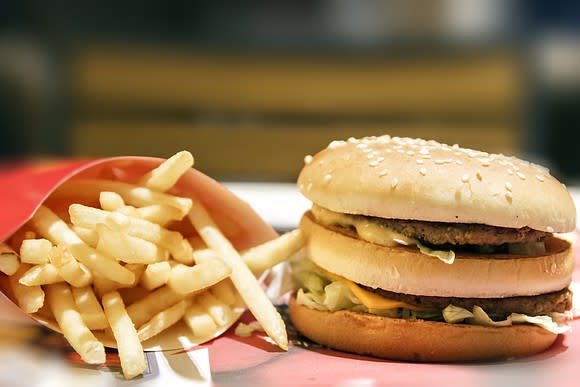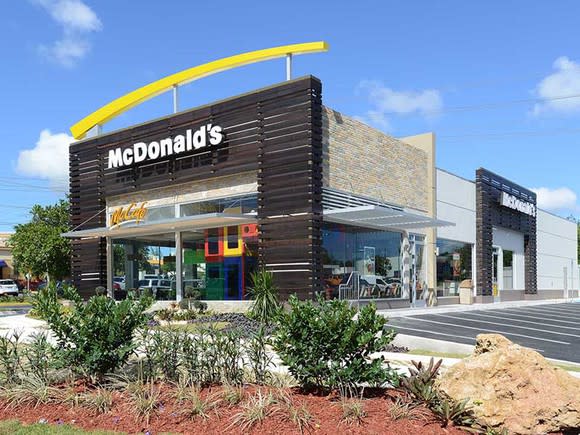Why Arcos Dorados Stock Has Taken a 30% Haircut in the First Half of 2018
Stock in Arcos Dorados Holdings (NYSE: ARCO), the world's largest McDonald's Corporation (NYSE: MCD) franchisee, has stalled in 2018, losing more than 30% of its value after nearly doubling last year.
While the company no longer faces an existential threat due to its formerly untenable debt load, and while quarterly performance has improved over the last year, investors still fret about a few major threats hanging over Arcos Dorados shares. I recently discussed one of these, the highly inflationary economy of Venezuela.
In this article, I'll treat what's perhaps a more significant pressure: the influence of Brazil on the company's financials -- which is both a risk and an opportunity.
Brazil comprises Arcos Dorados' largest source of revenue, accounting for 40% to 45% of total company sales in any given quarter. Arcos has placed 929 out of 2,190 of its systemwide restaurants in Brazil, and this heft means that Brazil makes up an entire company operating segment, alongside the Caribbean division, the North Latin American division (NOLAD), and the South Latin American division (SLAD).

Image source: Getty Images.
This exposure can have an outsized impact when Arcos Dorados translates its division results from the local Brazilian currency, the real, to its home reporting currency of the U.S. dollar, particularly during periods in which the real exhibits relative weakness against the dollar.
We're in one of those periods now. Year to date, the real has depreciated approximately 12% against the U.S. dollar, thanks in part to political unrest -- even as the Brazilian economy has posted positive gross domestic product (GDP) growth for four consecutive quarters. That's a significant improvement, given the preceding two years of negative growth in GDP.
To quantify this impact: In Arcos' first quarter of 2018, Brazil segment revenue improved roughly 4.5% in constant currency. Yet a 3.2% decline in the real against the greenback during the three months reduced total top-line expansion in Brazil to just 1.3%.
Despite the compression of revenue and earnings due to a weak real, it's important to note that Brazil still constitutes the highest contributor of earnings to Arcos' books. In the first quarter of 2018, the Brazil division posted adjusted EBITDA of $48.7 million, versus $7.3 million in NOLAD, $23.0 million in SLAD, and a loss of $25.7 million in the Caribbean division (which includes Venezuela).

Image source: Arcos Dorados.
Another way a depreciating real can hurt Arcos is through import costs. That is, as the Brazilian currency loses purchasing power against the dollar, imported food commodity costs increase in local currency terms. During Arcos' most recent earnings conference call, CFO Mariano Tannenbaum explained that the company employs currency hedges to absorb some of the risk to food and packaging expense in Brazil, as well as in other countries that have dollar-linked import costs.
Tannenbaum went on to explain that for Arcos, there's at least one benefit to a weaker Brazilian currency. The company holds about $650 million in dollar-denominated U.S. debt on its balance sheet. But it generates the majority of its cash in Brazilian reals. So management also employs currency hedges on Arcos' debt, and this has the effect of reducing gross debt when the Brazilian real loses value.
Risk versus opportunity
By now long-term investors in Arcos Dorados understand that despite currency risk, and despite the volatility of the Brazilian economy, the company may thrive by stubbornly expanding within this huge market in the coming years.
To some extent, Arcos can offset the impact of a shrinking Brazilian real through pricing. Currency weakness and local inflation in Latin American countries often go hand in hand. That's been the case in Brazil recently, where the annual inflation rate is approaching 3%. So, bumping up menu pricing to keep in line with inflation increases revenue, and somewhat mitigates the negative impact each quarter when Arcos converts Brazilian sales back into U.S. dollars.
Holding shares in the sprawling McDonald's franchisee can seem daunting given the complexity of the considerations discussed above. But when you strip away all the various currency effects, Arcos is expanding its top and bottom lines in Brazil -- and increasing its already dominant market share. So, while caution informs the stock price, the fundamental positive investing case for Arcos hasn't changed. It's just that the need for patience may have increased a bit this year.
More From The Motley Fool
Asit Sharma has no position in any of the stocks mentioned. The Motley Fool has no position in any of the stocks mentioned. The Motley Fool has a disclosure policy.

 Yahoo Finance
Yahoo Finance 